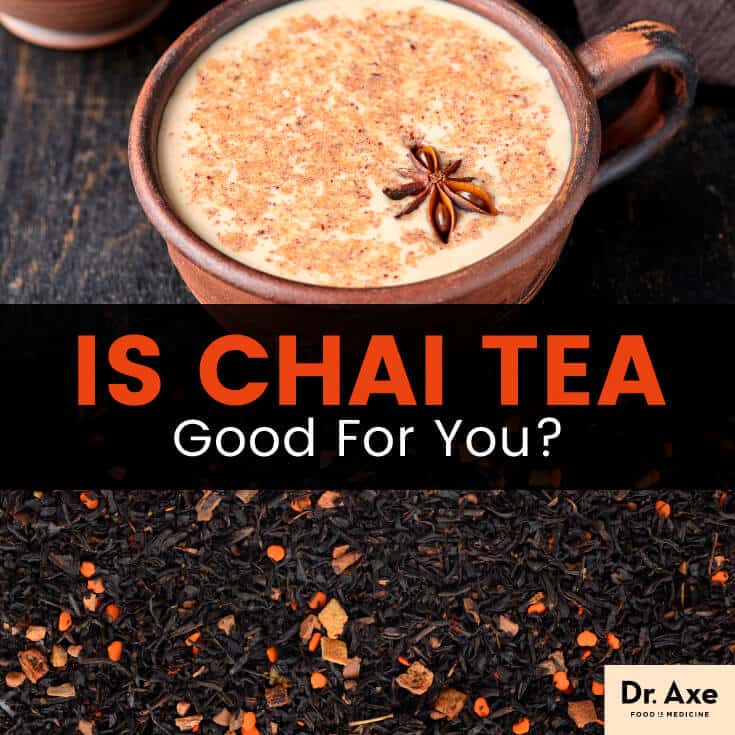
Chai tea has been popular for years, hitting the big coffee shops in both hot and iced form, but is chai tea is good for you? Well, yes — for the most part — though it depends on what chai tea you drink.
Like most foods, it’s easiest to find the not-so-healthy version of chai tea just about anywhere these days. It’s your job to keep an eye on the label and know what your chia tea contains. However, traditional chai tea ingredients are amazing, and as long as you pay attention, you can have the best version — the version let’s you say to the question is chai tea good for you.
Chai, or chai tea, is made using various combinations of spices and tea, but the most popular blend starts with black tea and a blend of ginger, cardamom, cinnamon, fennel, black pepper and clove. As you can imagine, each of the ingredients contains its own special benefits, and when combined, it can be even more powerful for the body. In fact, chai benefits include possibly helping support digestion, lower blood sugar and promote cardiovascular health. (1)
Is Chai Tea Good for You? Benefits of Chai Tea
1. Anti-Inflammatory: Reduces Pain Associated with Arthritis
There are several ingredients in chai tea that may help eliminate pain associated with arthritis and other inflammatory-causing disease, specifically clove, ginger and cinnamon. Studies show that whole clove, crushed clove or clove oil can help reduce inflammation, as can cinnamon and ginger.
According to the Arthritis Foundation, ginger has properties much like the well-known go-to ibuprofen. Used in Asian medicine for centuries, ginger works by suppressing inflammatory molecules. A specialized ginger extract called Eurovita Extract 77 was found to reduce inflammatory reactions in rheumatoid arthritis as effectively as steroids, as noted by a 2012 in vitro study. (1)
Research published in Pharmaceutical Biology examined the anti-inflammatory effects of certain oils, including clove, coriander seed and black cumin oils. Albino rats fed with these cold-pressed oils, and the researchers found that these oils, especially the clove oil, “could minimize acute inflammation.” (2)
As far as cinnamon is concerned, a study published in Phytotherapy Research found that cinnamon bark essential oil shows promise as an anti-inflammatory when evaluating human skin cells. However, the researchers noted that “further research is required to clarify its clinical efficacy.” (3)
2. Treats Nausea
Ginger is one of the ingredients in chai, making the tea a great choice for a nagging upset tummy. Ginger can help reduce nausea and vomiting and even rid the discomfort of motion sickness and chemotherapy-induced nausea.
According to research analyzed in Critical Reviews in Food Science and Nutrition, the traditional folk remedy for gastrointestinal complaints may even remedy the nausea and vomiting associated with cancer. Ginger contains bioactive compounds within the rhizome of the spice, particularly gingerol and shogaol. These compounds display anti-inflammatory properties, as previously noted, making it a great choice for anyone experiencing upset stomach issues of any sort. (4)
3. Contains a High Antioxidant Load
If you ask anyone in Japan or China, places where heart disease is much lower than our Western numbers, about their beverage of choice, it’s likely to be tea. John Weisburger, Ph.D, and senior researcher at the Institute for Cancer Prevention, notes that teas are loaded with antioxidants called polyphenols.
We know that the job of antioxidants is to scavenge the body of free radicals that can cause cell damage. According to WebMD and Dr. Weisburger, tea has more polyphenols than fruits and vegetables. While I’m not suggesting you leave your fruits and vegetables, adding a cup or two of tea into your day could offer even more antioxidants to help combat free radical damage and disease. (5)
4. Aids Digestion
Many spices have long been known to aid in digestion, and black pepper is one of them. It’s common for chai tea to be consumed after a meal for that very reason. So how does black pepper aid in digestion? It seems that it has the ability to support the pancreas in secreting digestive enzymes. This action helps speed up the time required to digest fats and protein. (6)
Studies experimented with a few different blends of spices, all of which contained black pepper and all of which helped with digestion. Combining just the right spices, such as those found in chai tea — specifically cardamom, ginger, fennel, clove and black pepper — can offer support for the gut. (7)
5. Can Help Reduce the Risk of Heart Disease
Cinnamon is found in everything from Greek food to candy, and it’s a key ingredient in chai tea that’s been linked with reduced risk of heart disease. It can help those with diabetes by regulating blood sugar levels, aids in stabilization of cholesterol and triglycerides, and studies have shown cinnamon helps reduce blood pressure.
Known as the eternal tree of tropical medicine, cinnamon contains vital oils and other derivatives, giving it the ability to help combat diabetes and cancer, as well as cardiovascular disease. It’s even been reported to help fight Parkinson’s and Alzheimer’s disease as well. (8, 9)

Is Chai Tea Good for You? Chai Tea vs. Green Tea
While generally speaking, tea can be a combination of leaves, stems and spices, there are differences in chai tea versus green tea. Green tea’s benefits from its high levels of flavonoids called catechins, while chai tea boasts health-benefitting polyphenols. Green tea is made from unprocessed tea leaves, whereas chai is usually made from fermented and oxidized black tea leaves combined with the spices, ginger, cardamom, cinnamon, fennel, black pepper and clove.
Regarding caffeine content of chai tea and green tea, both contain it. Black tea, an ingredient of most chai tea recipes, contains up to 72 milligrams of caffeine per cup. Green tea has about 50 milligrams. You can find caffeine-free versions of these teas if you prefer to avoid the caffeine altogether, particularly if you’re concerned about caffeine overdose. (10)
Chai Tea Recipes
There are many chai tea recipes out there. For a version that allows you to say yes to the question is chai tea good for you, try my Chai Tea Recipe that combines the benefits of coconut milk, maple syrup, nutmeg, cinnamon and clove.
You can also try the following healthy chai tea recipes:
History of Chai Tea
Did you know that chai is actually the word for tea in India? That means you can just call it chai when referencing that tea, but in the U.S., it’s usually referred to as chai tea. To add clarification, it’s actually masala chai that we know as the spicy tea with milk that feels so cozy. Masala, or spiced tea, references a combination of spices when talking about Indian cuisine.
Tea growing first came about by former British India and British Ceylon in the 1870s in an effort make tea easier to access. Although wild tea trees had been known to some tribes for a very long time, these leaves were commonly used as herbal medicines, notably as Ayurvedic remedies.
It wasn’t until England came on the scene, around the beginning of the 20th century, that the working class had taken to drinking tea every day. This tea drinking evidently gave way to better health, making a cup of black tea with milk and sugar quite popular as a break during the workday. Corporate companies throughout Britain and continental Europe took on this habit in the 1970s in an effort to enhance efficiency in the workplace. The tea was typically delivered by a woman pushing her trolley through the offices twice a day.
So where does chai tea or masala tea come into the picture? India took a little more time to see the benefits, but eventually it stuck, generating the introduction of a typical Indian cup, the spicy milk tea brew called masala chai. From there, chai tea quickly became part of the Indian way of life.
Traditionally, the way of preparing chai was done by simmering or boiling a mixture of buffalo milk and water with loose black tea and spices, wrapped in a cloth for straining. The chai spices are those that create warmth in the body. The most commonly used in India are ginger root, green cardamom and cardamom seed, cinnamon, star anise, clover, and peppercorn. Fennel seed, lemongrass, licorice root and nutmeg are also used in some blends. Overall, these spices have long been known to have important beneficial side effects, such as detoxing, cleansing and killing bacteria.
Is Chai Tea Good for You? Chai Tea Precautions
Unless you have allergies relating to the specific ingredients, drinking chai tea should not be a problem. However, most chia tea has black tea. Black tea contains caffeine. Caffeine is a stimulant and can affect your sleep and anxiety. I also caution anyone who is pregnant or breast-feeding to be conscious of caffeine intake. You can have chia without the black tea and still get the benefits it offers.
With all of these benefits, you simply cannot go wrong, but you have to know what you are getting if you buy it at a coffee shop. Most add all kinds of artificial sweeteners, sugar, and loads of unnecessary ingredients that can negatively affect your health. So like all foods, just because it says chai doesn’t mean it’s healthy. Know what’s in it before you have it, or simply make it yourself and enjoy.
Final Thoughts: Is Chai Tea Good for You?
- Is chai tea good for you? The answer is yes, so long as it doesn’t have any added unhealthy ingredients like artificial sweeteners.
- Common chai tea ingredients include black tea, ginger, cardamom, cinnamon, fennel, black pepper and clove. Anise, clover and peppercorn are also used in several recipes.
- Chai tea benefits include its anti-inflammatory effects that can help ease arthritis, preventing and treating nausea, aiding digestion, and reducing the risk of heart disease. Another reason you can say yes to the question is chai tea good for you is its high antioxidant load.
- If you’re worried about too much caffeine consumption, beware. Chai does have caffeine, though it’s possible to make or buy caffeine-free versions.
Read Next: Black Tea Benefits the Heart, Digestion, Stress Levels & More
From the sound of it, you might think leaky gut only affects the digestive system, but in reality it can affect more. Because Leaky Gut is so common, and such an enigma, I’m offering a free webinar on all things leaky gut. Click here to learn more about the webinar.
